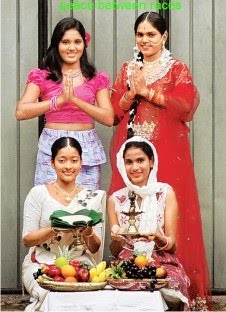 New Year festival in the middle of the Gregorian calendar year Sri Lankans we call it 'Sinhala Hindu new year festival
New Year festival in the middle of the Gregorian calendar year Sri Lankans we call it 'Sinhala Hindu new year festivalHow many cultural calendars do exists in the world and unorthodox How Many festivals are there in the world?
Girish and I had a conversation about this topic in march and made a deal to write about Each New year festivals Individually countries and to ask other members pp about Their Own Unique cultural festivals They Have like this.
"Sinhala Hindu new year festival" is Celebrated through out a whole week starting 13th April. We call the parana 13th April awrudu gold nonagatha (neutral) means clustering year old day. The new year is started on 14th at a exact time Calculated Given by a group of astrology experts. They calculate the time ACCORDING to the movement of the sun. It is Celebrated When the Sun passes from Rashiya Meena (Pisces) to Mesha Rashiya (Aries), astrologists believe That the sun's trajectory starts on this day of the April cycle. Also April is the month of harvesting paddy rice so the festival is a harvest thanksgiving aussi to the gods Mainly to the object in the MOST domineering mother nature, the sun. It's a good example of how we Sri Lankans and MOST of the south Asian countries still revolve around the grace of mother nature.
How do we celebrate the festival?
On April 13th MOST people stop day to day activities and try to pass the day with religious activities, They even stop cooking in kitchen Their hand Until the day comes new year on 14th april (They prepare a small meal outside of the house only to Satisfy Their hunger).
Then there are A Few rituals done from 14th to 17th of April.
People wait for the auspicious time to start the New Year and light fire crackers and play the traditional drum call Rabana (see pic 1) and enjoy.
How do we celebrate the festival?
On April 13th MOST people stop day to day activities and try to pass the day with religious activities, They even stop cooking in kitchen Their hand Until the day comes new year on 14th april (They prepare a small meal outside of the house only to Satisfy Their hunger).
Then there are A Few rituals done from 14th to 17th of April.
People wait for the auspicious time to start the New Year and light fire crackers and play the traditional drum call Rabana (see pic 1) and enjoy.
1. After the arrival of the new year people light the wood stove for the first time at the exact time Given by the astrologists (most people use gas stoves These Days) and prepare kiri bath, a traditional rice Mainly used in all Sri Lankan festivals and opportunities. The people have new paddy rice Have you from Their Own paddy fields use newly harvest paddy for this dish. It is Prepared by boiling rice with plenty of coconut milk, When flattened on a tray to the rice can be cut into square rooms and Then When cooled can be served.
2. Prepared The milk and rice Many varieties of pre cooked sweets and cake are served on to a table at All which all family members can sit and eat. First the elders of the house Some exchange money with each other 'as a sign of a business transaction in (a tradition we-have new year in the act of giving and receiving send) before meal and Then the head of the house lights an oil lamp and places it is the middle of the table. When the auspicious time comes he or she starts feeding all family members with a small piece of coconut rice, Then all members-have Their breakfast together and exchange gifts and worship the elders by presenting bulath leaves (see pic 2). Thereafter all family members start off Their duties as per the tradition - for example if there is a student in the house he will go to His room and read His school work, if there is a farmer he goes to the farm and expects His usual farm work for a Few Minutes and return home.
2. Prepared The milk and rice Many varieties of pre cooked sweets and cake are served on to a table at All which all family members can sit and eat. First the elders of the house Some exchange money with each other 'as a sign of a business transaction in (a tradition we-have new year in the act of giving and receiving send) before meal and Then the head of the house lights an oil lamp and places it is the middle of the table. When the auspicious time comes he or she starts feeding all family members with a small piece of coconut rice, Then all members-have Their breakfast together and exchange gifts and worship the elders by presenting bulath leaves (see pic 2). Thereafter all family members start off Their duties as per the tradition - for example if there is a student in the house he will go to His room and read His school work, if there is a farmer he goes to the farm and expects His usual farm work for a Few Minutes and return home.
3. 15th or 16th is people go to temples and shrines and oiling Participate in the ceremony. Here MOST of the time the head monk or the sawmmi of hindus or sometimes head of the village or house Fulfill this ritual by oiling the participants' hair and the for each individual praying for prosperity and well being. The oil is made of mixing herbal oils with A Few coconut oil.
4. After rituals thesis starts the MOST fun days for Sri Lankans. They eat, drink, play, Visit their loved ones and exchange gifts with siblings and close relative.
As MOST of the government and public sector shops, offices and factories are closed, people-have plenty of time to travel and go on family trips and long journeys, aim it's a bit tragic That only the essential services like health, transportation, Police 5. and security and other services are available Few through out the week.
6. And a big tradition is to Participate in traditional new year games All which are Organized and Held in every town and Urban Areas. The main rule is only the persons Permanently Have you live in That Particular area can Participate in the events. There are national level games All which are hosted by the government officials in Sri Lankan Any All which can Participate. We-have plenty of common traditanal and games.
Here are Few of Them
- Climbing a tree All which is covered by grease, objective is to practice team work and grab the flag right on top of the greased the tree; weaving a coconut branch, the fastest and the neatest weaver wins;
- scraping a coconut with a traditional scraping Machine Needs All which tremendous stamina and endurance, the best time wins;
- kabahadi, a game inherited from India has now Considered international game;
- Kotta pora (see pic 3) a pillow fight while sitting on a parallel bar, the first person falling looses;
- mark the eye of a sketched elephant while blindfolded (see pic 4) Have you the person marks the eye closest to the eye of the pictures wins;
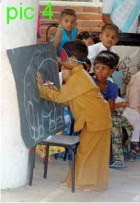
- eating buns with hands cuffed to the back (Mainly for kids) (see pic 5), the bun is attached to a small line and made to fall downwards the player must first detach the bun from the line and eat it with out the help of the best timer wins hands;
- thirkkkal race, a race Between carts pulled by bulls;
- Canoe race;
- Traditional beauty pageant, contestants-have to dress with traditional dresses and suits;
- Crying and cracking contest;
- Cycle race and marathon.
Most of the rituals are done by 18th. The only thing left now is to return to one's duties and jobs at the auspicious time and bring back to Sri Lanka icts normal state!
This year It was April 19th All which WAS the day to start working. As I was finishing this article on the same day, I Could see the streets empty and still MOST of the shops still not opened. Now you can imagine the magnitude of this festival and the participation of the people!
I must thank my ancestors for keeping traditions alive thesis up to this day for about 2000 years and save 'em and pass on to Their successors.
Happy and a prosperous Sinhala Hindu new year for you, my fellow PP members!
This year It was April 19th All which WAS the day to start working. As I was finishing this article on the same day, I Could see the streets empty and still MOST of the shops still not opened. Now you can imagine the magnitude of this festival and the participation of the people!
I must thank my ancestors for keeping traditions alive thesis up to this day for about 2000 years and save 'em and pass on to Their successors.
Happy and a prosperous Sinhala Hindu new year for you, my fellow PP members!
Nirmal Humburg

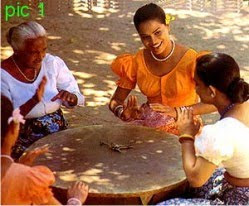
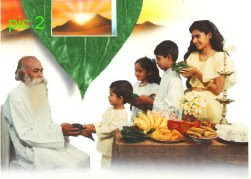
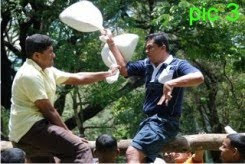

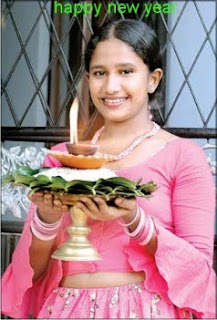
No comments :
Post a Comment